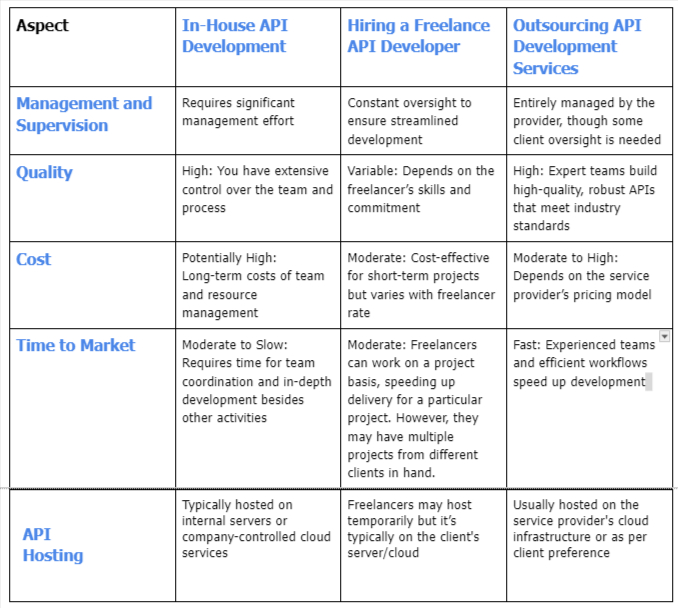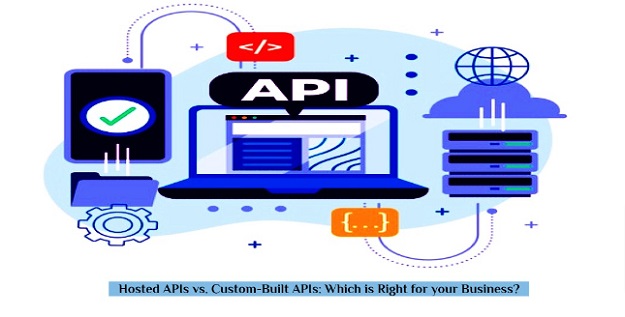Did you know the hosted API management market is projected to reach US$ 13.7 billion by 2027, growing at a CAGR of 25%? This growth can be attributed to:
1. Increasing need for data-first monitoring
2. Enhanced connectivity between users and internal-external machines
3. Secure API development and management
It is also fueled by the lack of skilled professionals who can develop and implement custom API solutions.
While this development allows many businesses to leverage API capabilities without having to do the groundwork, it also points to the reliance on API hosts and third-party service providers. Additionally, without a sound knowledge of the latest API development trends and standards, you can only find your way around standard, off-the-shelf API solutions that may not cater to specific challenges.
So, should you work with hosted APIs or develop your own? This blog will discuss both approaches to API development in great detail, helping you make an informed decision that aligns with your budget and meets your requirements.
Exploring Hosted APIs
APIs that are provided as a service (APIaaS) and managed by a third-party service/provider are known as hosted APIs. These are not hosted or maintained on your server or IT infrastructure. Hosted APIs allow developers to integrate diverse functions into their applications without creating them from scratch.
How to Utilize Hosted APIs?
To use a hosted API, companies sign up for the service. In return, they receive an API key, a code-based identifier that connects to an API call and performs a specific function. To leverage this function, developers incorporate it into their code.
Benefits of Integrating Hosted APIs
1. Easy Scalability: Hosted APIs provide the flexibility to scale your application effortlessly. As your user base grows, these APIs adapt to handle increased loads, eliminating the need to overhaul your technical infrastructure.
2. Streamlined Development: Using hosted APIs simplifies the development process by providing ready-made solutions for a diverse range of tasks, allowing developers to enhance user experience without developing different elements. This not only speeds up the development process but also allows your team to focus on enhancing other aspects of your project.
3. Cost Efficiency: Integrating advanced functionalities through hosted APIs gives you an upper hand in the development process. You save on the expenses and time that would have been spent developing specific functions, which directly translates to significant cost savings in the long run.
4. Secure API Management: Hosted APIs are known for their robust security capabilities, a critical feature in a digital world full of API data breaches, such as those affected Trello and Spoutible account details. Given these risks, securing APIs with strong authentication, authorization, and rate-limiting mechanisms becomes imperative. This is often too complex and time-consuming to do in-house. With hosted APIs, you get multiple configurable options to define and enforce usage limits.
Limitations of Hosted APIs
1. Dependence on third-party service providers may lead to performance issues if your provider experiences downtime. They may also discontinue certain functionalities, causing you to consider other options.
2. Hosted APIs have already been developed to cater to a particular functionality, making them generalized solutions that may not fit your requirements.
3. Using APIs hosted on external gateways can pose data privacy risks, as sensitive information is processed, stored, and propagated by third-party servers.
Sometimes, integrating hosted APIs with existing systems can be complex, particularly if they have limited compatibility options.
Exploring Custom-Built APIs
Contrary to using hosted APIs, you can specifically design and develop your APIs to handle unique requirements in a particular business application.
How to Build Custom APIs?
These are either developed in-house, by hired freelancers, or by outsourcing the process to an API development service provider.

Benefits of Custom-Built APIs
Full Control over APIs: When developing custom APIs, you can have complete control over every aspect, from its design and development to its error management and authentication protocols. This allows for a governed development process that aligns with your goals. Additionally, you can implement strategic upgrades as per your technology roadmap, reducing reliance on a third-party vendor to roll out feature enhancements.
High Flexibility: Custom APIs can be engineered from scratch. This gives you the flexibility to configure them for unique data structures, follow workflow rules, and integrate with your existing business logic— something that off-the-shelf hosted APIs cannot.
No Vendor Lock-Ins: Developing custom APIs allows you to avoid the risks of vendor lock-in associated with third-party services. Vendor lock-in happens when your systems become heavily dependent on a vendor’s technologies, making it costly and challenging to switch providers due to deep technological integration. This independence not only enhances flexibility but also allows for greater control over upgrades and costs while aligning better with compliance and privacy standards.
Optimized Performance: As custom APIs are designed and developed for your specific applications, they can be optimized to reduce latency and improve response times. This makes them effective in high-load environments where processing speed and resource management are critical, such as in real-time data analytics applications.
Limitations of Custom APIs
Designing and developing custom APIs may initially require upfront investment. It takes time, resources, and consistency to identify the scope, plan, build, test, and then maintain a portfolio of APIs.
Building custom APIs requires experience and specialized skills. This may necessitate hiring new talent and training existing employees (if you’re building it in-house), or leveraging professional API development services.
Custom API development projects take a relatively longer development time compared to using hosted APIs, potentially delaying market entry. However, leveraging custom API integration services can help you optimize this time.
If not designed for varying and increasing user load, custom APIs may be inefficient in scaling operations. This will further require intervention, adding to the expenses.
Don’t Miss –
How SERP APIs are changing the Internet Search?
Hosted APIs vs Custom-Built APIs: Which is Better for you?
Both hosted, and custom APIs have their own benefits. While one expedites and streamlines the development process, the other provides greater flexibility and customization scope. Consequently, when deciding between hosted APIs and custom-built APIs, the choice depends on specific needs, resources, expected time-to-market, and long-term business goals.
When to Choose Hosted APIs
Utilize hosted APIs if:
# Your time-to-market is critical, and you need a readily integrable solution
# You have fewer in-house technical capabilities or development scope
# You are expecting variable user loads and will need flexible scaling without major infrastructural modifications
# You need a generalized, readily integrable solution
# You have a limited initial budget
When to Choose Custom APIs
# Develop custom APIs if:
# Your requirement cannot be met by off-the-shelf API solutions
# You need complete control over the functionality and security
# You have an in-house team
# You don’t want to rely on third-party API vendors
# You can invest more initially for a solution that aligns with long-term goals
Bringing it All Together
Moving forward, business will likely persist in using a combination of both hosted and custom-built APIs. While hosted APIs accelerate the development process without much effort, custom APIs can help you with granular functionalities. For those looking to balance custom APIs with enhanced process efficiency, a hybrid approach—utilizing both custom and hosted APIs—offers a unique solution. Regardless of your approach, the end goal remains clear: a sustainable API strategy that aligns with your business goals and helps you stay agile in an increasingly competitive market.

